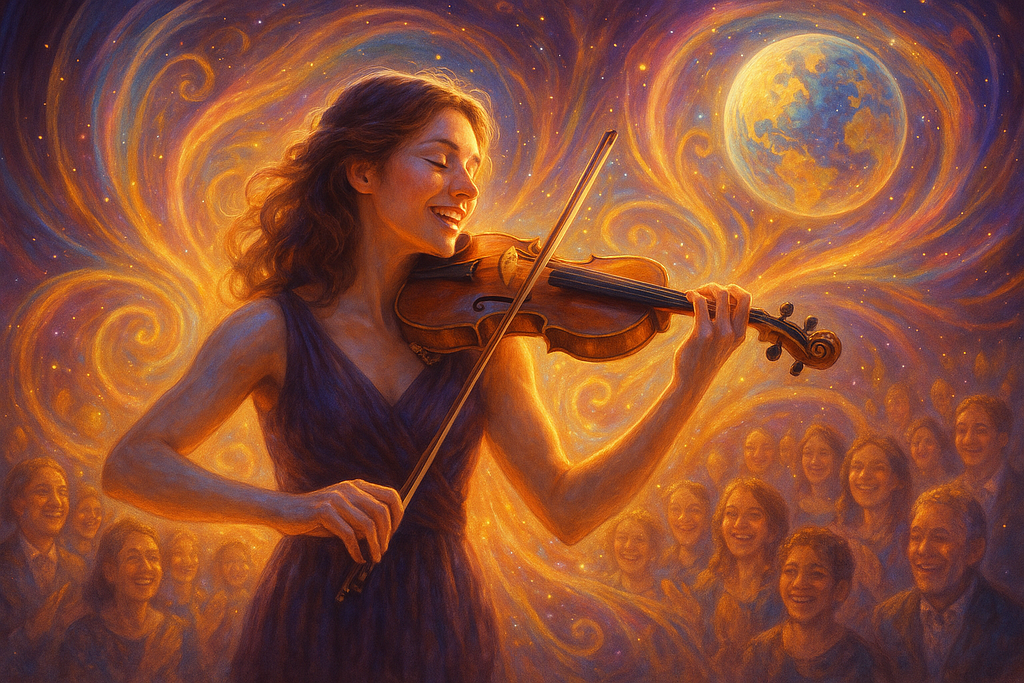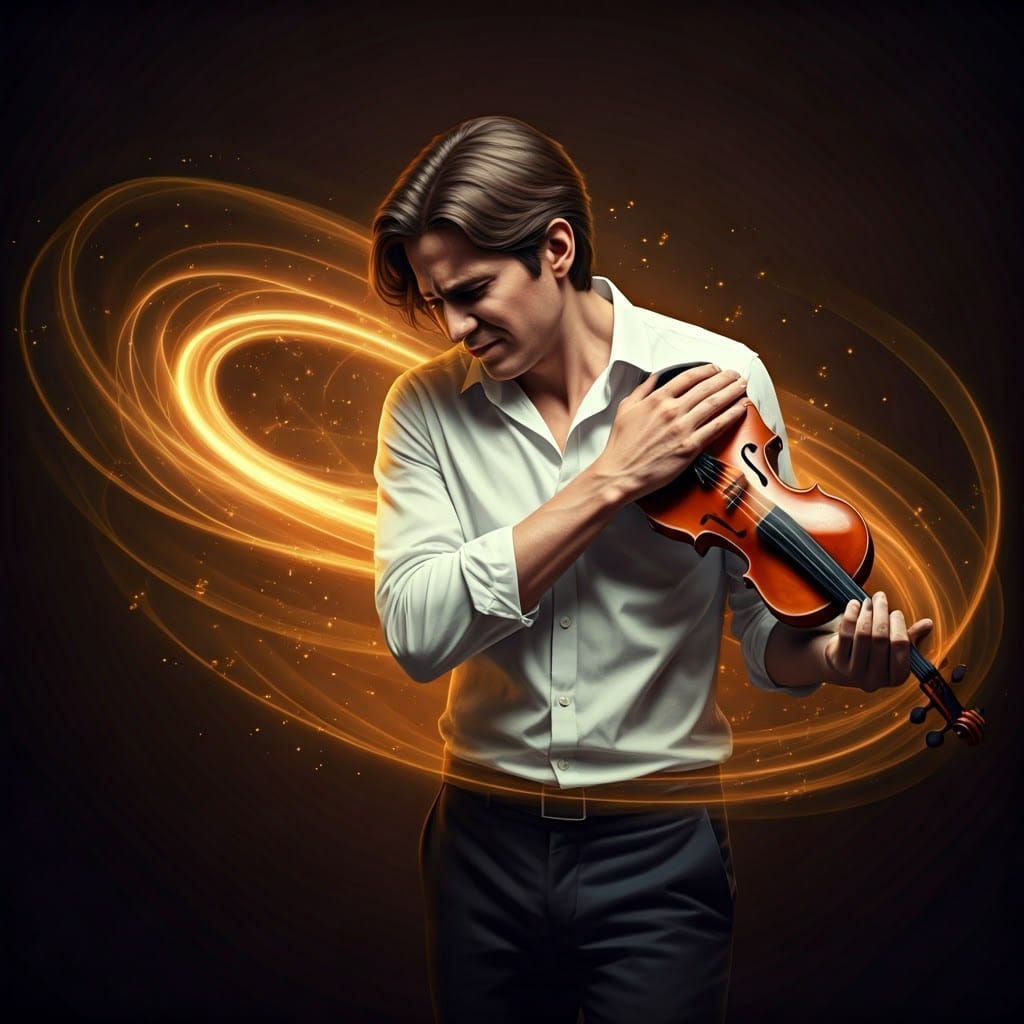When you practice music (or dance, or other creative arts), does it feel more like you’re “toiling” at music, rather than actually “playing” music?
Why does this happen, despite our intuitions that creative practices should be… well, creative, inspiring, fun, and satisfying?
The roots of this go very deep, to the ideas that form the foundation of our current civilization: reductionism and materialism, as well as the need to create workers to fit the “machine” of our economic system.
In this excerpt from my upcoming book, I explore the deeper historical and philosophical context for why we so often end up toiling at our creative activities, rather than enjoying them as the life-giving acts of devotion to beauty that they truly are.
We are all born with a love for creative expression. It is our constant preoccupation in our early years – all healthy young children spend nearly all their waking time in play and creative exploration. And as we grow and develop, our motor skills and ambitions change, as well, leading to more and more sophisticated and differentiated forms of expression and communication. We somehow inherently know that our creativity is a gift and so we are constantly giving our gifts to our family and friends.
However, for those of us who stay in touch with our creative impulses and want to develop them further, we soon encounter some painful experiences. For one, our modern education system was created from the need to produce undifferentiated, compliant factory workers and bureaucrats who would be willing to stifle their creative impulses and do mind-numbing tasks for 12 hours a day. We see evidence of this form of industrial-age education in the regimented schedules of school, how success is measured in how closely we conform to the teacher’s predetermined goals, the separation of the spirit of the task from its technique (and then the exclusive focus on technique over creativity, rather than learning technique in service of our creative impulses), and how we as students are forced to sit still for long periods of time, doing and learning things we don’t really care about for many hours a day, year after year.
This form of education breaks the spirit of many of us because it seems to say, “Everything that you like to do is unwelcome; your gifts, creativity, love, and wildness are all irrelevant to the task at hand.” Our job as a student growing up in this environment is to lock all of our natural desires and feelings away and pay attention to whatever (usually mind-numbing) task the authority figure has set forth. Even creative classes and performance arts lessons are usually focused on a form of skill acquisition that is divorced from the lived experience of what we actually want to do. All of this sends the message, “Your natural proclivities are bad, but if you do what Teacher wants, you can redeem yourself.” It’s the War Against the Self all over again.
Most of us who end up becoming performing artists rebel at this program (which is probably why we go into the arts in the first place). But even as we develop our skills to higher and higher levels, to the point of going to an arts college and then becoming a professional performing artist, the separation of our soul’s desires from the technique necessary to fully express them creates a lingering sense of dissatisfaction and anxiety. In a direct extension of the factory-model of education, we are taught to learn and practice as though we were machines, mindlessly, arduously, and repetitively inculcating the “correct” techniques.
This attitude, a reflection of reductionism, materialism, and the separation of spirit from matter, is nearly all-encompassing and goes well beyond just getting basic techniques and building blocks of a performance down. We can see it in the application of all manner of expressive techniques, postural and movement ideas, and even in the attempt at soulful, heartfelt expression. Have you ever seen someone screw up their face and body as they really try to “feel” the music? The muscular effort in this attempt at emotional expression is more an artifact of the discrete and separate self than a genuine expression of the player’s heart.
The feeling is like this: “My mind, the source of agency, is in here (usually located in the head and behind the eyes) with the correct version of the task already predetermined, and I have to make my body – meat machine that it is – learn how to conform with the ideal version of the task. And if it doesn’t work, I’ll just try harder!” The sole preoccupation in this model for learning a song, dance, or play is to “get the notes/moves/words right,” and when we get even one note wrong, the focus of attention becomes to “fix” the mistake.
As students, hearing teachers or caretakers relentlessly focus on what we did wrong is incredibly dispiriting. Studies show that an ideal “praise-to-criticism ratio” is somewhere in the range of 6:1 (though I suspect that it’s actually much higher). As one report from the Harvard Business Review stated, “Even the most well-intentioned criticism can rupture relationships and undermine self-confidence and initiative. It can change behavior, certainly, but it doesn’t cause people to put forth their best efforts.”
This isn’t to recommend a pollyannaish, “everybody gets a gold star just for participating” kind of approach; we as students aren’t stupid, and can tell when we’re being misled by teachers and caretakers. Plus, without honest feedback, we’ll never actually learn what we want to learn. Instead, it’s about recognizing that our attempts at learning something new in the presence of a teacher are like attempts to give a gift to that teacher: and who would you be more willing to continue giving a gift to someone who sees the gift in your halting attempts and gives honest, positive feedback in return, or someone who refuses your gift again and again by only pointing out its flaws?
There’s something in us that knows that we were meant for more than merely “getting the notes right,” so this leaves us feeling dissatisfied and frustrated, all perhaps without knowing why. This focus leads to an incredibly tedious, boring, and effortful means of learning something, which is why it’s so hard to get little kids on board with it. It takes many years, but by the time we reach adulthood, many of us, having introjected the criticisms of our teachers and caretakers, subconsciously carry out their overly critical or technique-focused agenda. This is the seed of our own inner critic, which can become so loud and ever-present that some of us almost totally forget our inborn creative gifts, and we end up actually believing that the inner critic and its program of force and control is really what creative expression is all about.
Self-Guided Exploration
Consider how you go about learning a new piece. Spend some time journaling with these prompts:
- What are your values in practicing?
- What’s the point of practicing to you?
- What do you most pay attention to when you practice?
- What do you consider to be a “success” in learning something?
- Does your body get more tight or more free when you practice? Can you tell when or why?
- Are you focusing more on developing your gifts or on inculcating technique?
- What thoughts go through your mind when you practice?
- What’s your overall attitude when you practice?
What’s “100 Days of Soulforce”? I’m embarking on a mission to spread the word about Soulforce Performing Arts because I believe it is a needed message for artists of all kinds in our times. To that end, I’m making 100 videos over the coming 100 days (or so) to explain all the different angles and ideas, and to hopefully spark inspiration in you! Each video will have inspirational and practical ideas for you to bring more Soulforce to your life as a performing artist.
These ideas are a part of my upcoming book: “Soulforce Performance Arts: Redefining Artistic Performance, Practice, and Pedagogy in a World That’s Lost Its Mind.” Subscribers to my newsletter will get early access and special perks. 🙂
Joseph Arnold Violinist, Alexander Technique teacher, Founder of the Soulforce Arts Academy
JosephArnold.com — Sign up for my bodacious mailing list and blog!
Image credit: Omaha Conservatory of Music https://omahacm.org/calendar/keyboard-explorers-age-9-12-lv-2-winter/2022-02-26/



